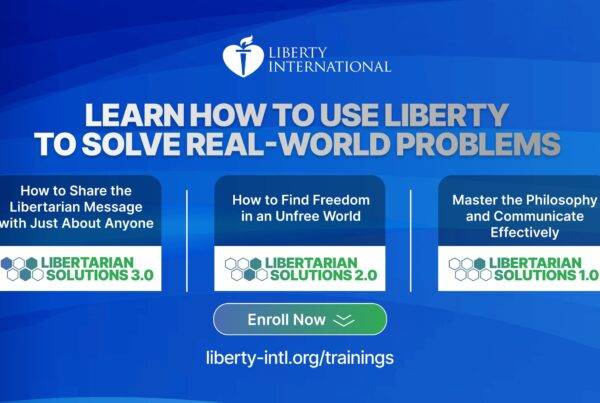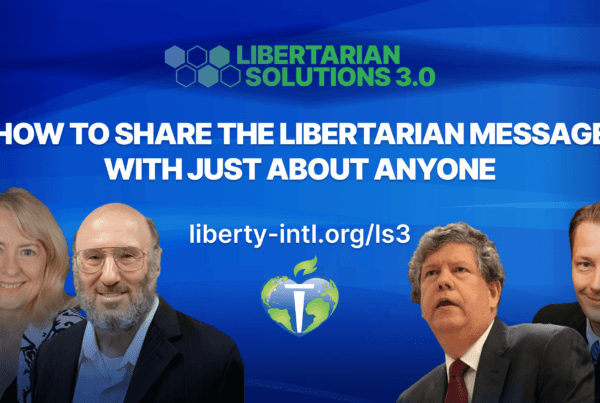


The Libertarian Solutions online learning course will give you an enhanced understanding of the real-world application of libertarian principles, teach you how to communicate these life-enhancing concepts effectively and illustrate how to awaken your friends, family, and acquaintances to the “good news” of liberty.
Libertarian Solutions is a three-part online learning course consisting of several sessions presented by experts who have used and experimented with these tools themselves. We focus on quality, substantial information, and practical solutions that can be applied in everyday life. The sessions were recorded live.

“I am writing to sincerely thank you and your team for the great work during Libertarian Solutions 3.0. I have gained in-depth knowledge which is helping me lead my local think tank in Ghana, thus YAFO Institute. Having received my certificate, I have taken steps to frame it.”
Ghana
How to Share the Libertarian Message with Just About Anyone
How to Find Freedom
in an Unfree World
Master the Philosophy
& Communicate Effectively
In our pursuit of advocating liberty, it is crucial to recognize that anger towards proponents of statism, while understandable, can impede the dissemination of our message.
By fostering humility and compassion, the class aims to share the ideals of liberty more effectively, promoting understanding over confrontation and facilitating meaningful conversations that bridge ideological gaps.
In some perspectives, the global warming crisis may be questioned if temperatures are not consistently warming as expected. Some argue that climate change initiatives are viewed as a Trojan Horse for socialism, as they fear it serves as a pretext for expanding the Welfare State and misrepresenting capitalist principles.
Michael Severance discusses how Libertarianism and Christianity share a strong compatibility rooted in their shared value of personal liberty. Encouraging a harmonious relationship between these two ideologies is essential, as they both advocate for limited government intervention and uphold the freedom of choice. In alignment with Lord Acton’s wisdom that “All power tends to corrupt and absolute power corrupts absolutely,” there exists a common thread between these beliefs that calls for increased camaraderie and understanding between Christians and libertarians.
One of the Quran’s fundamental legal principles is the unequivocal prohibition of initiating coercion, essentially embodying the non-aggression principle. It explicitly states, “Let there be no compulsion in religion.” However, it’s important to acknowledge that some Muslims may not fully grasp this principle or interpret it in ways that lead to unwarranted impositions on fellow believers. It’s crucial to recognize that liberty is also an inherent Islamic value, reinforcing the importance of promoting both freedom of choice and peaceful coexistence within the faith.
Advocating for liberty is like being a good teacher. To change people’s minds, we need to be ready for their tough questions about different topics like the environment, poverty, or abortion. So, we should write down these questions and find good answers by doing our own research. As Mary Ruwart wisely mentions , “If we want to change the world, we must first be willing to change ourselves.” This means we should be well-prepared and knowledgeable before we try to convince others about liberty.
The concept of a world without a Welfare State might seem unfamiliar to many today, yet it was the reality for Americans and much of the world two centuries ago. During the late 19th and early 20th centuries, central governments had minimal involvement in social welfare, with fraternal societies, churches, and voluntary institutions primarily addressing the needs that the State now theoretically covers. In essence, while we often associate the State with welfare provision, it is worth acknowledging that societies can function without such extensive government involvement in social welfare.
American history provides a valuable lesson in the effectiveness of privately-built roads from the country’s early days, resulting in an efficient road system. This historical precedent highlights the feasibility of constructing roads through the private sector, a model that has also proven successful in places like Chile in Latin America. It underscores the potential benefits of private sector involvement in infrastructure development and challenges the conventional notion of government as the sole provider of such services.
The prospect of rendering abortion obsolete through the ability to transfer a fetus from an unwilling mother to a willing one is on the horizon, supported by advancing scientific capabilities. This promising development stands poised to reshape the discourse surrounding reproductive choices. It underscores the potential for a future where alternative solutions to unplanned pregnancies may supersede the need for abortion.
An insightful session on LGBTQIA+ Communities, State Marriages, and Immigration .Privatizing all aspects of a country’s territory, including natural resources, can be seen as a way to manage immigration conflicts through individual property rights, but it raises practical and ethical questions about resource management and access
The influence we wield should never be underestimated, for the seeds we sow today may yield significant results in the future. It’s important to recognize that some of our most impactful victories may not involve nurturing the next great champion of liberty but preventing individuals from veering toward ideologies like Karl Marx or Michael Harrington. Our efforts in guiding others can shape the course of their beliefs and, ultimately, the direction of society
Throughout history, various ideals of a perfect society have emerged, often deemed utopian and unattainable. Libertarians, too, envision an ideal society, but what sets this vision apart is its attainability through limited government and a steadfast commitment to individual liberty. Unlike some other philosophies, the libertarian aspiration for a better world is rooted in principles that can be realized, offering a tangible path toward the realization of this ideal society.
The notion that immigrants steal jobs is refuted by the fact that they often contribute to job creation, and labor competition can indeed drive innovation, productivity, and service improvements, ultimately benefiting society as a whole. Advocating for open borders becomes more compelling when people recognize the potential advantages it holds for fostering prosperity and facilitating the exchange of talent and ideas across borders.
Sharing the libertarian message through storytelling is not only impactful but also deeply connective, bridging the intellectual and emotional realms. Stories possess the unique ability to engage both the mind and the heart of the audience, capable of evoking smiles and even tears as individuals grasp the profound principles of liberty. Through narratives, we hold the power to impart these invaluable lessons in a way that resonates on a personal level, fostering a deeper understanding and appreciation for the cause of liberty.
The influence we wield should never be underestimated, for the seeds we sow today may yield significant results in the future. It’s important to recognize that some of our most impactful victories may not involve nurturing the next great champion of liberty but preventing individuals from veering toward ideologies like Karl Marx or Michael Harrington. Our efforts in guiding others can shape the course of their beliefs and, ultimately, the direction of society.
Pillar 1: Mental and Emotional Freedom: Getting Rid of Self-Sabotage
Lawrence Reed emphasises the vital connection between personal character and the pursuit of freedom. He argues that a society’s commitment to individual liberty is closely tied to the moral and ethical qualities of its citizens. Reed contends that a strong foundation of virtues, such as responsibility, integrity, and self-discipline, is essential for both preserving and advancing freedom within a society. In essence, he underscores the idea that character traits play a pivotal role in shaping the course of a free society.
Mary Ruwart, in her exploration of “What is mental and emotional freedom and how do we attain it?” delves into the realm of personal liberty beyond the physical. She discusses the concept of mental and emotional freedom, which involves having control over one’s thoughts, feelings, and reactions, even in the face of external challenges or pressures. Ruwart suggests that attaining mental and emotional freedom requires self-awareness, mindfulness, and the ability to manage one’s emotions and thoughts constructively. She advocates practices such as meditation, emotional intelligence, and self-reflection as ways to achieve this kind of freedom, ultimately leading to a more empowered and fulfilling life.
Jeffrey Tucker, in addressing the question of “How can libertarians improve their relations with themselves and the rest of the world?” emphasizes the importance of effective communication and outreach. He suggests that libertarians should work on better articulating their ideas and principles in a relatable and persuasive manner. Building bridges with those who hold differing beliefs through respectful dialogue and finding common ground could be another key aspect of his approach. Additionally, fostering a sense of unity and collaboration within the libertarian community may also be emphasized as a way to present a more cohesive and appealing image to the world. Ultimately, Tucker advocates for a strategy that promotes understanding and cooperation while staying true to libertarian values.
Robin Koerner’s “The Power of Refusal” explores the idea that refusing to comply with unjust or intrusive government policies can be a powerful tool for promoting liberty. In this context, he argues that citizens should exercise their right to dissent when they believe their freedoms are being infringed upon. Koerner advocates for peaceful acts of civil disobedience, non-compliance with unjust laws, or grassroots movements aimed at challenging government overreach. The central message is refusing to go along with policies that violate individual rights can serve as a catalyst for positive change and the preservation of personal liberty.
Jeff Crawford, in discussing how subconscious beliefs influence our ability to accumulate wealth, explores the idea that our deep-seated beliefs about money and success can shape our financial outcomes. He argues that limiting beliefs, such as a fear of failure or a belief in scarcity, can hinder our ability to generate wealth. Conversely, empowering beliefs, such as self-confidence and a positive mindset, can be instrumental in achieving financial success.
Pillar 2: Financial Freedom: How to Be Prosperous in Spite of the State
Dan Mitchell discusses strategies for individuals with limited financial resources to build wealth over time. He emphasises the importance of budgeting, saving, and investing wisely, even with modest income, as well as the power of compound interest and frugal financial habits.
Steve Mariotti explores the idea that entrepreneurship can be a path to financial and personal freedom, irrespective of formal education. He discusses real-world examples and practical steps individuals can take to start and succeed in their entrepreneurial ventures.
Lobo Tiggre provides an overview of the fundamentals of investing, covering topics such as different asset classes, risk management, and basic investment strategies. This introduction is geared towards helping individuals make informed decisions in the world of finance.
Mark Skousen offers guidance on establishing smart saving habits, particularly for younger individuals. He discusses the benefits of early savings, investment options, and long-term financial planning to ensure financial security in the future.
Aaron Koenig delves into the world of cryptocurrencies, providing insights on how individuals can enter and thrive in this rapidly evolving market. He covers topics like blockchain technology, selecting cryptocurrencies, and managing the risks associated with digital assets.
Pillar 3: Global Citizenship: How NOT to Belong to Anyone’s Country
Kenli Schoolland discusses the strategic considerations and practical aspects involved in relocating to another country with a specific purpose in mind. This includes factors such as legal requirements, cultural adaptation, and financial planning for a successful international move.
Christopher Lingle explores the benefits and reasons behind acquiring a second passport. This encompasses advantages such as enhanced travel options, increased personal security, and the ability to access opportunities and freedoms not available with a single citizenship.
Andreas Jürgens provides insights into the lifestyle and economic advantages of living in a special economic zone in the Caribbean. He discusses the unique regulations, tax benefits, and business opportunities that can contribute to a fulfilling life in such zones.
Christoph Heuermann explores the concept of permanent tourism as a way to live without a fixed residence and, consequently, without the burden of certain taxes and regulations. He discusses the legal and practical aspects of this lifestyle choice and how it can lead to greater personal freedom.
Pillar 4: Health Freedom: How to Live Longer and Healthier
Bill Faloon and Mary Ruwart explores recent advancements in the field of anti-aging research, discussing how certain interventions have shown promise in reversing aspects of aging in both animals and humans. They delve into topics like regenerative medicine, genetic therapies, and lifestyle factors that contribute to extending human healthspan.
David Vequist discusses the cost-saving potential of medical tourism, where individuals seek healthcare services in other countries known for high-quality and more affordable medical treatments. He provides insights into the logistics, benefits, and considerations associated with medical tourism as a way to reduce healthcare expenses.
Jose Cordeiro offers practical tips and lifestyle changes that individuals can implement to enhance their longevity and overall well-being. These includes recommendations related to nutrition, exercise, preventive healthcare, and the latest advancements in longevity science.
The 1962 Kefauver-Harris Amendments, meant to safeguard patients, ironically choked medical progress. The FDA’s iron grip on drug development doubled timescales, ballooned prices 80%, and stifled innovation, costing millions of lives. While safety concerns persist, affordable natural solutions like nutrients are sidelined in favor of expensive, patented drugs. Rethinking these Amendments is urgent, for their deadly side effects on lives lost and innovation stifled may outweigh even the worst drug disasters.
Libertarians have a three-part program that provides the solution to pollution, vanishing rain forests, endangered species, and even manmade impacts on climate change. However, few libertarians are aware of it.
The War on Drugs kill at least 5X as many people as the drugs themselves. Indeed, countries that have decriminalized drugs find that students do less drugs than under prohibition.
Scarcity forces us to choose wisely. We create and trade goods to fulfill our endless desires, relying on human ingenuity to improve both. Advanced markets connect these actions, but regulations, though well-intended, can stifle entrepreneur creativity, leading to fewer choices, lower prosperity, and ultimately, less freedom for everyone.
Join us for an overview of Sweden’s history and political economy. We will discuss how Sweden went from being one of Europe’s poorest countries to being the world’s fourth richest country — over the course of just one century. This course will also cover the rise and fall of Sweden’s welfare state and an overview of Sweden’s current political and economic conditions.
We rightfully celebrate the Enlightenment and the Industrial Revolution as great changes that facilitated our present standard of living — but it was really entrepreneurs who built this world. These entrepreneurs are creating our future in more ways than producing goods and services. This lecture will focus on how entrepreneurial action can be truly revolutionary — economically, politically, and socially.
Economics is an enormously powerful tool. The economic way of thinking uncovers many hidden truths about how the world works. Yet modern mainstream economics has in several ways turned its back on the power of economic reasoning. This lecture will discuss several important and fundamental ideas that once made economics great, but that modern economics has turned its back on.
Throughout history and around the world, people have migrated to improve the conditions of life for themselves and their families, either fleeing oppression and natural calamity or seeking opportunity and improved livelihood. This has often been met with resistance — fear of race, religion, or competition. Prof. Schoolland helps us examine these fears and opportunities.
Nineteenth century economist Henry George asserted that protectionism in all of its forms does to a nation in peacetime what an enemy would do to it in wartime. Prof. Schoolland invites us to examine routine practices of blockade in wartime throughout history and compare with the impact of protectionism in many forms of trade, shipping, and migration.
For most people, the biggest question they have about American healthcare is: Why is it so expensive? The answer is regulation — and if you don’t understand how regulation drives up prices and drives down quality, you’ll never understand why the healthcare system is broken (or how to fix it!). Dr. Varner has worked for years on the inside, and combining his insider’s knowledge of the industry and a lifetime of study of free-market economics, he’ll show you where the system is broken, the perverse incentive structures that influence market actors, and multiple realistic policy proposals that can fix the terrible problems. Don’t enter another debate about healthcare unprepared.
Picture a bustling marketplace where anyone can trade, innovate, and rise. That’s the promise of free markets: less government, more opportunity. Countries like Hong Kong, thriving proof, show how this unleashes prosperity for all, not just the privileged few. It’s not perfect, but compared to stifled economies controlled by red tape, the choice is clear: let the market work its magic. Unleash the potential in everyone, and watch poverty shrink, not expand. So next time someone wants more government, remember the bustling market. That’s the future we should build, together.
Thomas Jefferson advocated for the young America: “Peace, commerce, and friendly relations with all, entangling alliances with none.” Dr. Ruwart and Prof. Schoolland will examine the multitude of ways throughout U.S. history that politicians have behaved counter to Jefferson’s advice — with consequences harmful to a peaceful and prosperous existence.
Dr. Ruwart and Prof. Schoolland critically examine problems and controversies concerning the notion of intellectual property rights. Is there an ethical and pragmatic basis for IP?
Join two university professors as they expound on their personal journeys in the academic world, examining problems and pitfalls for a free and prosperous world.
